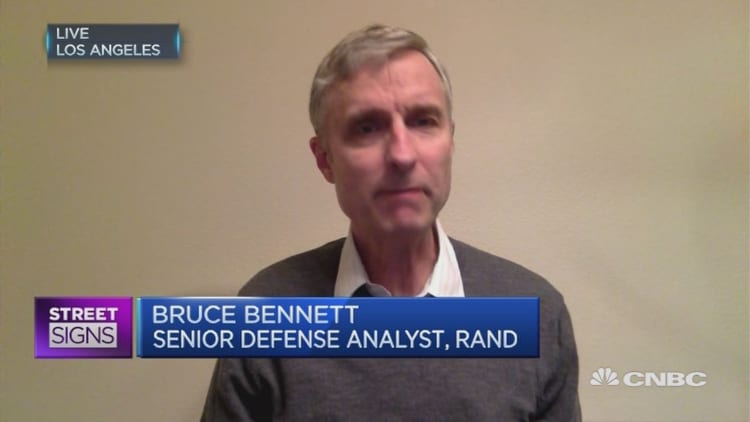The United States has begun shipping a controversial anti-missile system to South Korea after North Korea test-launched four medium-range missiles on Monday, U.S. officials told NBC News.
The system, called THAAD, which stands for Terminal High Altitude Area Defense, is an anti-missile system designed to counter a threat like that from North Korea. Other THAAD systems are already active in Hawaii and Guam to defend against North Korea, but the shield hasn't yet been deployed to South Korea — a scenario that Beijing has denounced as a "clear, present and substantive threat to China's security interests."
More from NBC News:
Immigration Lawyer Navigates Uncertain Future for Many
In First HUD Remarks, Ben Carson Calls Slaves 'Immigrants'
DNC Chair Tom Perez: New Travel Ban is 'Unconstitutional'
The "first elements" of the THAAD system have already arrived in South Korea, U.S. defense officials told NBC News on Monday, just hours after Hwang Kyo-ahn, South Korea's acting president and prime minister, urged the United States to deploy the system as soon as possible, saying consequences of a nuclear-armed North Korea would be "horrible and beyond imagination."
Defense officials stressed that THAAD "is strictly a defensive system" aimed solely at defending South Korea against North Korean missiles.

White House Press Secretary Sean Spicer signaled the deployment Monday when he told reporters that the United States is "taking steps to enhance our ability to defend against North Korea's ballistic missiles, such as through the deployment of a THAAD battery to South Korea."
U.S. defense officials confirmed to NBC News on Monday night that that meant delivery was already under way — not that the United States was simply restating its previous promises to send the system to South Korea sometime in the future.
They told NBC News that the planned deployment had already been in the works and that the timetable wasn't affected by the latest North Korean launches, which Spicer called a "very serious threat."
The North Korean news agency KCNA, whose pronouncements are usually regarded as propaganda for North Korean leader Kim Jong Un, said the launches early Monday were part of a drill to test potential strikes against "the bases of the U.S. imperialist aggressor forces in Japan."
The Defense Department said Defense Secretary James Mattis spoke with Japanese Defense Minister Tomomi Inada and that they agreed the North Korean launches were "an unacceptable and irresponsible act that undermines security and stability in the region." Japanese Prime Minister said President Donald Trump shared similar sentiments with him in a telephone call Monday.

Two senior U.S. defense officials told NBC News on Monday that North Korea actually fired five missiles, not four, but that one of them failed to launch. The four missiles that made it off the launchpad traveled more than 600 miles east toward Japan.
U.S. Defense Department officials said the missile launch posed no threat to North America.
North Korea is banned from testing any ballistic missile technology under a set of U.N. resolutions. But it has threatened to conduct more missile tests in response to an annual two-month joint military exercise between Seoul and Washington, which continues through April.
Last month, North Korea launched a ballistic missile toward the Sea of Japan, a move that South Korea's military described as a "show of force" to the Trump administration.
Rodong Sinmun, the North Korean ruling party's official newspaper, said in a commentary that "new types of strategic weapons will soar" if Seoul and Washington continue their annual drills, which the North claims are preparation for war against it, the South Korean news agency Yonhap reported.

